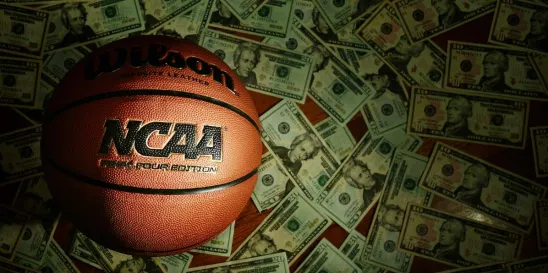Nick Saban's retirement wasn't the sole focus of this week's headlines in college sports. In the realm of name, image, and likeness (NIL), the NCAA Division I Council took significant steps in reforming collegiate NIL rules during its annual meeting on January 10. The unanimous adoption of a proposal aimed at providing student-athlete protections related to NIL deals marked a noteworthy development, set to become effective on August 1, 2024.
The approved proposal encompasses four key elements designed to enhance the protection of student-athletes in connection with NIL activities. These elements include:
- Voluntary Registration Process for NIL Service Providers: This involves agents, financial advisors, etc.
- Mandatory Disclosure of NIL Agreements: Student-athletes are required to disclose information regarding any NIL agreement exceeding $600 in value to their school. This disclosure must occur within 30 days of entering or signing the NIL agreement, covering contact information, terms of the arrangement, and relevant compensation details. Prospective student-athletes must also adhere to the same disclosure requirement within 30 days of enrollment.
- Collaboration for Template NIL Contracts: The NCAA plans to collaborate with schools in developing a template NIL contract along with recommended contract terms.
- Continuous Education and Resources: The NCAA will formulate a comprehensive plan to offer continuous education and resources, supporting student-athletes in understanding policies, rules, and best practices related to NIL.
Among these changes, the registration process and the potential introduction of template contracts and standardized provisions are likely to have a significant impact on those involved in NIL deals. A template contract is particularly of note, especially in light of the NIL lawsuit involving former Florida Gator Gervon Dexter.
NIL Deals Moving "In-House"
In addition to the adopted proposal, on January 11, the NCAA Division I Board of Directors formally directed the Division I Council to introduce proposals related to school involvement in NIL deals. These proposals would permit schools to support NIL activities and subject entities associated with schools (i.e., collectives) to the same standards as the school.
If adopted, the proposals would lift NCAA restrictions on the extent of support that schools and their third-party service providers can offer to student-athletes in connection with NIL activities. While direct compensation to student-athletes by schools for the use of their NIL would still be prohibited, schools would be permitted to identify and facilitate NIL deals between student-athletes and third parties.
The proposals would also clarify the definition of an NIL entity as an individual, a group of individuals, or any other entity (e.g., a collective) organized to support the athletic interests of an NCAA school or group of schools by compensating student-athletes for NIL activities on behalf of itself or another third party.
Moreover, the proposals would eliminate regulations governing communications between schools and collectives regarding enrolled student-athletes. However, schools would remain prohibited from providing financial support or assets, directly or indirectly, to collectives.
Additionally, the proposal includes a prohibition on NIL entities engaging in any contact, correspondence, or communication, or providing any benefits to a prospective or potential transfer, until the prospect signs a letter of intent, participates in summer activities, practices with the team, or enrolls at the school and attends classes.
The Division I Council is expected to meet several times before the start of the football season to discuss these proposals and make recommendations. The NCAA Board of Directors will convene later this year in August, potentially acting on the council's recommendations.
NIL Efforts on the Federal Level Continue
While the NCAA is advancing proposals to allow schools more involvement in NIL deals, Rep. Gus Bilirakis released a revised college sports bill on January 11. This bill seems to contradict potential NCAA rule changes on NIL. The revised bill would prohibit the NCAA, conferences, and schools from entering into NIL deals with student-athletes. It would also mandate collectives to register and disclose all NIL deals and the collective's donor list.
Notably, the bill provides the NCAA with antitrust exemptions and states that college athletes cannot be employees — two provisions the NCAA has been seeking in a federal bill, especially in light of the numerous antitrust lawsuits the NCAA is currently facing. Congress is set to hold its 11th hearing on collegiate NIL issues on January 18, with a focus on Rep. Bilirakis's newly released college sports bill. NCAA President Charlie Baker is scheduled to testify at the hearing and discuss his recent proposal for a new Division I subdivision that allows schools more freedom to craft NIL rules and enables them to compensate student-athletes directly.
NCAA Punishes Florida State for NIL Rule Violations
Also, on January 11, news emerged that the NCAA had punished Florida State University (FSU), one of its assistant football coaches, and one of its collectives for NIL-related recruiting violations. In April 2022, the director of the collective, arranged by the assistant football coach, had a meeting with a potential transfer student-athlete. During the meeting, the collective offered the student-athlete an NIL deal that included payments of $15,000 per month, deemed an improper inducement.
As a result, FSU was levied penalties, including a $5,000 fine plus 1% of the football program's budget, a 5% reduction in football program scholarships, and recruiting restrictions. The assistant coach received a two-year show-cause order, and the collective, along with its director, was disassociated from FSU. The collective will be disassociated for one year and the director for three years. However, the collective is still permitted to enter into NIL agreements with current FSU student-athletes.
These recent developments underscore the dynamic nature of the NIL landscape, as the NCAA adopts a seemingly more proactive stance. However, the NCAA's proposals raise concerns as they conflict with the ongoing efforts for a federal NIL law, a cause the NCAA has actively lobbied for, thereby introducing complexity into an already evolving regulatory environment. While the increased involvement of schools in NIL deals is generally positive, the NCAA's proposals fall short in addressing key lingering issues in the NIL realm. These include matters such as the employment status of student-athletes, potential antitrust considerations, and the applicability of Title IX. Those engaged in the NIL space must stay abreast of the evolving rules and regulations to adeptly navigate this intricate landscape.




 />i
/>i

